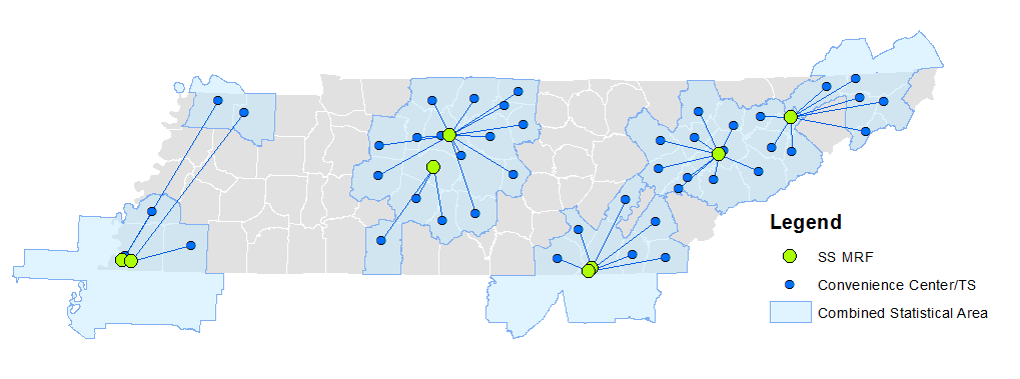Sustainable materials management is a term used to describe a solid waste planning approach that looks beyond simply ensuring sufficient trash disposal operations, to include the management of waste as a RESOURCE.
State governments are in a unique position to offer leadership to their municipalities, counties, planning districts and other units of government to develop a broader resource planning methodology. In addition, they are able to work in partnership with a wide range of economic development entities – from State Departments of Commerce to local Economic Development Commissions. This range of vision and departmental access allows for comprehensive planning, grant, and development dollars to be sourced to drive investment.
A state approach provides an opportunity to combine economic development, industrial infrastructure development, public/private partnerships, technical assistance, and education and outreach campaigns to benefit regions, not just individual communities.
State planning can start as basic support for existing municipal operations. For municipal recycling programs this can include grant funding or program support for basic services like collection vehicles, roll-carts, or community outreach initiatives. State involvement can expand to provide economic development assistance to help build processing infrastructure that will accommodate prevalent recoverable waste like cartons, plastic packaging, and food waste, and still further include industrial systems support that helps to grow the recovered material end-market manufacturing base. All key elements of sustainable materials management.

State planning efforts with an eye toward sustainable materials management may develop a regional approach to recycling and material recovery. Probably the best example of this is the use of state supported grant programs to provide infrastructure development for hub and spoke recycling networks within a defined region. This regional planning approach is a first step in creating better access to recycling in suburban and rural areas by helping communities with pockets of higher, and wider spread lower, population densities to provide more efficient and cost effective recycling services. Access to a hub for processing will allow rural communities to implement the same collection efficiencies as larger urban areas that have access to single stream processing.
Better access to recycling collection services and infrastructure along with robust education programs will increase the supply of material collected in residential, commercial and industrial sectors. The easier recycling is, the more people join in. Single-stream recycling has been shown to increase recycling rates by 30%. In addition, improved access to material diversion opportunities can rally the private sector to invest in business development that supports sustainable materials management including processing infrastructure and local manufacturing – developing industrial ecosystems that add value to recovered material and creates local jobs. Material value increases at each phase of recycling. PET plastic can be worth 7 times the value it started off at in a recycling processing facility as a plastic bottle. Similar value-add is found in aluminum, paper, cardboard, and other materials collected for recycling.
The ultimate goal of a well implemented sustainable materials management plan – especially one from a state approach – is the impact on industrial development. Making the ecological connection between material management and industrial development sends investment signals to a wide range of economic development clusters. Entire industry sectors can be supported favorably with the right approach – Advanced Manufacturing, Biotech, Electronics/High-tech, Automotive, Logistics/Consolidation/Distribution, Food Processing, Healthcare, Higher Education, and Agricultural Operations.
Local investment in recycling, especially as it relates to collection infrastructure and residential access is an important building block to an effective state approach. Municipal services can assist in driving infrastructure development that benefits the private sector. A new era of public/private partnerships can create a network of municipal and industrial capital investment to support the paradigm shift from sufficient trash disposal to sustainable materials management benefiting the local communities.

